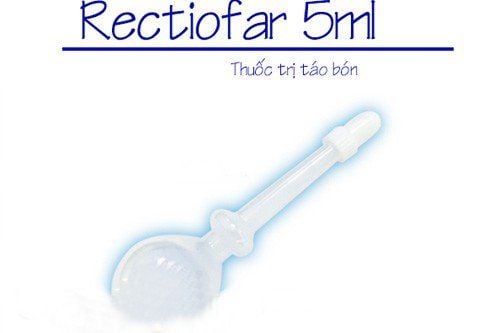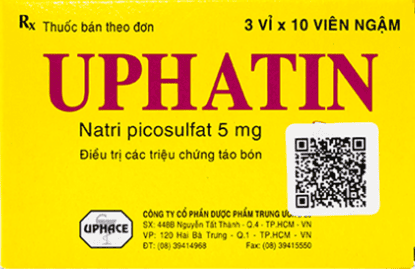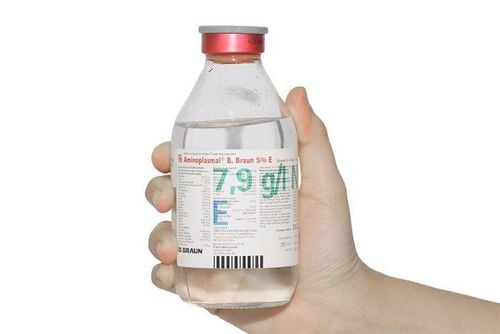This is an automatically translated article.
Tranfast with ingredients including Macrogol 64g, Sodium sulfate 5.7g, Sodium bicarbonate 1,680g, Sodium chloride 1,460g, Potassium chloride 0.750g, belongs to the group of osmotic laxatives. Tranfast is manufactured in the form of a powder package mixed into an oral solution. Before taking the drug, the patient should carefully read the information about the drug Tranfast.
1. What does Tranfast do?
Tranfast has ingredients including Macrogol 64g; Sodium sulfate 5.7g; Sodium bicarbonate 1,680g; Sodium chloride 1,460g; Potassium chloride 0.750g just enough for one pack, has the effect of increasing the amount of water in the intestine, increasing intestinal motility thanks to the osmosis mechanism. In addition, Tranfast replenishes electrolytes in the intestinal tract, because the amount of electrolytes in Tranfast is equal to the concentration of electrolytes in intestinal plasma, the drug rebalances the electrolyte exchange in the intestine after laxative .
Tranfast is indicated in the following cases:
Chronic constipation. Used to clean the colon before endoscopic exploration, X-ray, colon surgery.
2. Dosage and how to use Tranfast
2.1. How to use Tranfast Tranfast is produced in the form of a powder pack for an oral solution. Patients should consult a doctor and carefully read the instructions for use of the drug on the leaflet before use. Each packet of Tranfast is dissolved in 1 liter of water and shaken until completely dissolved.
2.2. Dosage of Tranfast Adult:
Usual dose: about 1 liter for 15 kg - 20 kg of body weight, corresponding to an average dose of 3 - 4 liters / person Depending on the patient's body weight, divided into 2 dosage regimens and provided that the entire amount of fluid must be introduced into the body (average about 3-4 liters). Single-dose regimen and twice-dose regimen. Oral dose 2 times: drink 2 liters the night before, drink 1-2 liters the next morning 3-4 hours before the examination, or drink 3 liters the night before and 1 liter the next morning before 3-4 hour visit. Oral dose once: The patient drinks 3-4 liters of medicinal water the night before. The recommended drinking rate is: 1-1.5 liters per hour (ie 250 ml every 10 to 15 minutes). Tranfast drug dosage can be adjusted based on the patient's clinical condition and other comorbidities under the direction and supervision of a doctor. Children: Do not use the drug in children under 18 years of age because there are no adequate clinical studies of the drug.
For people with liver failure, severe kidney failure: Use the drug when indicated and under the close supervision of a specialist.
3. Contraindications of Tranfast
Contraindicated to use Tranfast drug in the following cases:
Patients with a history of allergy or hypersensitivity to any ingredient of Tranfast drug. The patient is physically exhausted, dehydrated or has severe heart failure. Advanced colon cancer, Crohn's disease. Patients with intestinal obstruction. Patient with intestinal perforation. Paralytic patient. Patients with colitis or Megacolon disease.
4. Unwanted effects of the drug Tranfast
When using Tranfast, patients may experience some of the following side effects:
Digestive disorders: Abdominal pain, bloating, nausea, vomiting. Allergic reactions, Mild: urticaria, rash, pruritus. Severe: Anaphylaxis, angioedema, glottis edema,...).
5. Be careful when using Tranfast
When using Tranfast, it is important to note the following information:
In the elderly and weak, Tranfast should only be used under the supervision of a doctor. Do not use other drugs at the same time as Tranfast due to the following diarrhea. The drug may interfere with the absorption of concomitantly administered drugs. Patients with allergic manifestations: anaphylaxis, rash, urticaria, angioedema, immediately notify the doctor or go to the nearest medical facility for timely treatment. Although Tranfast has an electrolyte composition that is in balance with the electrolyte content of intestinal plasma, electrolyte disturbances can still occur in patients at risk, or in patients with existing or existing disorders. electrolyte disturbances before using Tranfast. Tranfast should be used with caution in patients treated with drugs that may increase the risk of fluid and electrolyte disturbances such as: hyponatremia, hypokalemia Patients with impaired renal function, heart failure, or treatment Tranfast concomitantly with diuretics increases the risk of electrolyte imbalance. Tranfast should be used with caution in patients with vomiting, bedridden patients, or patients with neurological or motor dysfunction, due to the risk of airway obstruction. Patients with heart failure, renal failure, at risk of acute pulmonary edema due to effusion. For pregnant women: There are very few studies on the use of Tranfast in pregnant women. Therefore, use Tranfast only when prescribed by a specialist. For women who are breastfeeding: There are no study data on the excretion of Tranfast in breast milk. The risk of adverse effects on the neonate with use has not been excluded. Use Tranfast only when prescribed by a specialist. Effects on the ability to drive and use machines: The drug increases intestinal motility, can cause diarrhea, dehydration, electrolytes, drivers and operators need to be careful when using the drug.
6. Tranfast drug interactions
When taking Tranfast drugs may cause drug interactions as follows:
When taking Tranfast with other oral drugs, making other drugs may not be absorbed due to the effect of increasing intestinal motility, emptying the intestines due to caused by drugs. Therefore, other drugs should be used 2 hours before taking Tranfast. Avoid using other oral medications during or after taking Tranfast and do not take oral medications prior to gastrointestinal procedures. Electrolyte disturbances may also occur, so extreme caution should be exercised when administering to patients with altered renal function, heart failure or taking diuretics. Tranfast is indicated in the following cases: Chronic constipation, used to clean the colon before endoscopic exploration, X-ray, colon surgery. However, Tranfast may cause some unwanted side effects such as diarrhea, abdominal pain, bowel dysfunction... Therefore, patients need to carefully read the information of the drug and consult the doctor. treatment before use.













